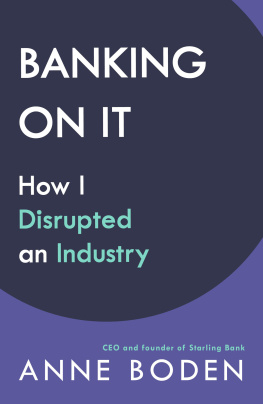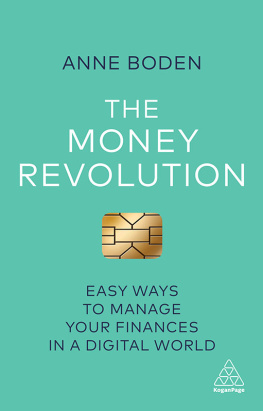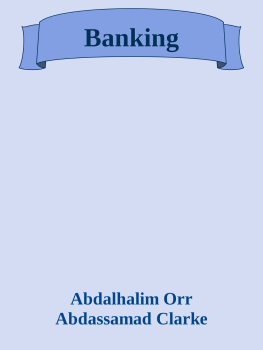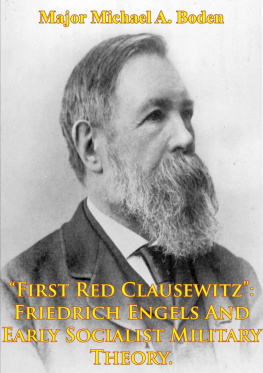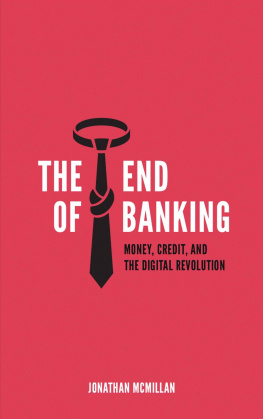Anne Boden - BANKING ON IT
Here you can read online Anne Boden - BANKING ON IT full text of the book (entire story) in english for free. Download pdf and epub, get meaning, cover and reviews about this ebook. year: 2020, publisher: Penguin Books Ltd, genre: Romance novel. Description of the work, (preface) as well as reviews are available. Best literature library LitArk.com created for fans of good reading and offers a wide selection of genres:
Romance novel
Science fiction
Adventure
Detective
Science
History
Home and family
Prose
Art
Politics
Computer
Non-fiction
Religion
Business
Children
Humor
Choose a favorite category and find really read worthwhile books. Enjoy immersion in the world of imagination, feel the emotions of the characters or learn something new for yourself, make an fascinating discovery.
- Book:BANKING ON IT
- Author:
- Publisher:Penguin Books Ltd
- Genre:
- Year:2020
- Rating:5 / 5
- Favourites:Add to favourites
- Your mark:
- 100
- 1
- 2
- 3
- 4
- 5
BANKING ON IT: summary, description and annotation
We offer to read an annotation, description, summary or preface (depends on what the author of the book "BANKING ON IT" wrote himself). If you haven't found the necessary information about the book — write in the comments, we will try to find it.
BANKING ON IT — read online for free the complete book (whole text) full work
Below is the text of the book, divided by pages. System saving the place of the last page read, allows you to conveniently read the book "BANKING ON IT" online for free, without having to search again every time where you left off. Put a bookmark, and you can go to the page where you finished reading at any time.
Font size:
Interval:
Bookmark:
Anne Boden is the CEO and founder of Starling Bank, the UKs first digital-only bank which she founded in 2014. She graduated in Computer Science and Chemistry, and started her career at Lloyds Bank where she helped establish the UKs first real-time payments system. She has held various executive-level jobs in the banking sector, including being Head of EMEA Global Transaction Banking across thirty-four countries for RBS and ABN AMRO, before leaving to start her own bank that could realize the potential of technology in financial services. Anne received an MBE in 2018, for services to financial technology, and sits on the board of UK Finance, which represents more than 250 firms in the banking and finance industry.

PENGUIN BOOKS
UK | USA | Canada | Ireland | Australia
New Zealand | India | South Africa
Penguin Books is part of the Penguin Random House group of companies whose addresses can be found at global.penguinrandomhouse.com.

First published by Penguin Books in 2020
Copyright Anne Boden, 2020
The moral right of the author has been asserted
ISBN: 978-0-241-45360-5
This ebook is copyright material and must not be copied, reproduced, transferred, distributed, leased, licensed or publicly performed or used in any way except as specifically permitted in writing by the publishers, as allowed under the terms and conditions under which it was purchased or as strictly permitted by applicable copyright law. Any unauthorized distribution or use of this text may be a direct infringement of the authors and publishers rights and those responsible may be liable in law accordingly.
To my parents, Nancy and Jack Boden, who taught me that happiness must be cultivated and treasured, because those who are always happy are the privileged few.
Sitting in the back of the taxi, my collar turned up, jacket closely wrapped around me and head low, it might have appeared as though I was hunkering down to keep the cold weather at bay. Except I wasnt. Granted, it was early in the morning, but the sun was already climbing steadily in an unusually cloudless blue sky over Dublin. It was July, after all.
No, I was trying to make myself invisible in a pathetic attempt to head off the inevitable question from the cab driver. I need not have bothered. It came anyhow.
What keeps you off the streets? the driver said in a friendly but nonetheless insistent way.
In other words: what did I do for a living? I weighed up my answer, aware that he was looking at me expectantly through the rear-view mirror. A number of people had already warned me about this and, since I had asked the taxi to take me to the HQ of Allied Irish Banks in Ballsbridge, the inquiry was inevitable.
Dont for heavens sake say what you do, theyd all said. Mention banking and youll get a thirty-minute lecture about evil bankers all the way from the airport to the office.
I wouldnt have blamed the driver for being curious, or resentful, just as I wouldnt have blamed any other person in Ireland. The year was 2012 and Ireland had suffered more than any other nation in the EU in the immediate fallout from the global credit crunch. Banks and bankers were firmly in the cross-hairs when it came to who should shoulder the blame.
The fall from grace had been so extreme that everyone had felt the impact. Just a few years earlier, the Celtic tiger economy was widely viewed as the poster child of the free market and, while no one exactly loved banks, everyone was happy that the much yearned-for boom times had finally arrived. And boom times they were. After years of a stagnant, agriculture-based economy, the nation appeared transformed, virtually overnight. The property sector became turbocharged thanks to the unfettered freedom to borrow and build. Banks were eager to lend and everyone saw an opportunity. To add to the feeling of prosperity, numerous US investors were irresistibly drawn to the Emerald Isle, helped by the shared language and Irish roots of many American investors, as well as a tempting low-tax regime. Anything the global boom threw in its direction, Ireland grabbed with both hands.
Then, of course, it all came crashing down. When the music stopped playing, Ireland was left standing with a frankly terrifying amount of debt. In 2008, AIB, the bank I was on my way to now, held 73 billion of loans, which represented half of Irelands GDP. After months of wrangling and uncertainty, AIB, along with Bank of Ireland, was forced to accept a 3.5-billion bailout from the government. The scale of AIBs bailout grew over time, when it became clear the initial payout was a drop in the ocean. Eventually it spiralled to reach a dizzying 13 billion. Ireland became, per capita, the most indebted country in the EU and its 14.3 per cent budget deficit was higher than that of Greece. In response, the Irish government slashed public spending by 7.5 per cent of GDP. Public sector pay was cut by 15 per cent, child benefit by 10 per cent and unemployment benefit by 4.1 per cent.
The fall from affluent largesse to desperate poverty was exceptionally hard and fast. People lost their jobs and their homes, with the most vulnerable in society being the hardest hit. And when it came to laying blame, the finger pointed firmly in the direction of the banks. Never mind that an entire nation and professional class had become intoxicated by greed, from politicians to investors to developers to estate agents and, yes, even ordinary folk it was bankers who had created the environment that allowed this to happen. No wonder my taxi driver eyed me with suspicion. I could have climbed in his cab and asked for a fast trip to Hades and got a friendlier reception.
AIB was undeniably a toxic brand. The banks appalling reputation exposed it to a number of issues, quite apart from the fact that none of its existing, or potential, customers trusted it one inch. Many of the people who worked there wanted to leave, but were pretty certain theyd never get a job elsewhere with AIB sitting on the top of their CV. Plus, any sort of recruitment was fraught with difficulty. No one in the wider financial sector trusted anyone who was remotely close to what had happened in the run-up to 2008, and promoting from within was never going to happen.
With senior heads rolling left, right and centre, AIB had to refill the posts with candidates drawn from all over the world. When I got the call about the chief operating officer vacancy in AIB, I was at a crossroads in my career, having just left my job as head of Royal Bank of Scotlands Europe, Middle East and Africa (EMEA) Global Transaction Services department. Looking back, I now realize how useful this period was to me. When I was working day-to-day, I barely had time to think. I was perpetually rushing from one crisis to another (particularly during 20089), or running to and from airports to fly off for lengthy meetings, or instructing consultants, or briefing my fellow bankers. I rarely had any time to sit down and consider the world around me. Now that I had reached a hiatus, however, I did just that. I stood back, looked at banking and began to wonder if we were all missing the point.
The inescapable truth was that, however shocking and traumatic was the financial meltdown of 2008, most of the banks seemed to have snapped back into business-as-usual without a backward glance. Wed come through the worst banking crisis in living memory and everyone was pretending nothing had happened. Move along, folks, nothing to see here.
Font size:
Interval:
Bookmark:
Similar books «BANKING ON IT»
Look at similar books to BANKING ON IT. We have selected literature similar in name and meaning in the hope of providing readers with more options to find new, interesting, not yet read works.
Discussion, reviews of the book BANKING ON IT and just readers' own opinions. Leave your comments, write what you think about the work, its meaning or the main characters. Specify what exactly you liked and what you didn't like, and why you think so.

